
Plainfield Riding and Driving Club was a horse riding club in Plainfield, New Jersey. It held an annual horse show starting in 1903. [1] [2]

Plainfield Riding and Driving Club was a horse riding club in Plainfield, New Jersey. It held an annual horse show starting in 1903. [1] [2]

The horse is one of two extant subspecies of Equus ferus. It is an odd-toed ungulate mammal belonging to the taxonomic family Equidae. The horse has evolved over the past 45 to 55 million years from a small multi-toed creature, Eohippus, into the large, single-toed animal of today. Humans began domesticating horses around 4000 BC, and their domestication is believed to have been widespread by 3000 BC. Horses in the subspecies caballus are domesticated, although some domesticated populations live in the wild as feral horses. These feral populations are not true wild horses, as this term is used to describe horses that have never been domesticated, such as the endangered Przewalski's horse, a separate subspecies, and the only remaining true wild horse. There is an extensive, specialized vocabulary used to describe equine-related concepts, covering everything from anatomy to life stages, size, colors, markings, breeds, locomotion, and behavior.

Equestrianism, commonly known as horse riding or horseback riding, includes the disciplines of riding, driving, or vaulting with horses. This broad description includes the use of horses for practical working purposes, transportation, recreational activities, artistic or cultural exercises, and competitive sport.
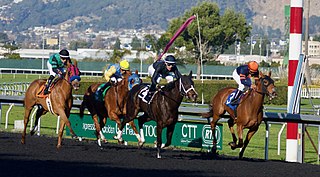
Horse racing is an equestrian performance sport, typically involving two or more horses ridden by jockeys over a set distance, for competition. It is one of the most ancient of all sports, as its basic premise – to identify which of two or more horses is the fastest over a set course or distance – has been unchanged since at least classical antiquity.
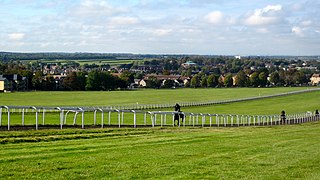
Newmarket is a market town in the English county of Suffolk, approximately 65 miles north of London. It is generally considered the birthplace and global centre of thoroughbred horse racing and a potential World Heritage Site. It is a major local business cluster, with annual investment rivalling that of the Cambridge Science Park, the other major cluster in the region. It is the largest racehorse training centre in Britain, the largest racehorse breeding centre in the country, home to most major British horseracing institutions, and a key global centre for horse health. Two Classic races, and an additional three British Champions Series races are held at Newmarket every year. The town has had close royal connections since the time of James I, who built a palace there, and was also a base for Charles I, Charles II, and most monarchs since. The current monarch, Queen Elizabeth II, visits the town often to see her horses in training.

The American Saddlebred is a horse breed from the United States. This breed is referred to as the "Horse America Made". Descended from riding-type horses bred at the time of the American Revolution, the American Saddlebred includes the Narragansett Pacer, Canadian Pacer, Morgan and Thoroughbred among its ancestors. Developed into its modern type in Kentucky, it was once known as the "Kentucky Saddler", and used extensively as an officer's mount in the American Civil War. In 1891, a breed registry was formed in the United States. Throughout the 20th century, the breed's popularity continued to grow in the United States, and exports began to South Africa and Great Britain. Since the formation of the US registry, almost 250,000 American Saddlebreds have been registered, and can now be found around the world, with separate breed registries established in Great Britain, Australia, continental Europe, and southern Africa.

A Hanoverian is a Warmblood horse breed originating in Germany, which is often seen in the Olympic Games and other competitive English riding styles, and has won gold medals in all three equestrian Olympic competitions. It is one of the oldest, most numerous, and most successful of the Warmblood breeds. Originally a carriage horse, infusions of more Thoroughbred blood lightened it to make it more agile and useful for competition. The Hanoverian is known for a good temperament, athleticism, beauty, and grace.

A horse show is a judged exhibition of horses and ponies. Many different horse breeds and equestrian disciplines hold competitions worldwide, from local to the international levels. Most horse shows run from one to three days, sometimes longer for major, all-breed events or national and international championships in a given discipline or breed. Most shows consist of a series of different performances, called classes, wherein a group of horses with similar training or characteristics compete against one another for awards and, often, prize money.

Ascot Racecourse is a dual-purpose British racecourse, located in Ascot, Berkshire, England, which is used for thoroughbred horse racing. It hosts 13 of Britain's 36 annual Flat Group 1 horse races and three Grade 1 Jumps races.

The Pony of the Americas is a pony breed developed in the state of Iowa in the United States. The foundation stallion was an Arabian/Appaloosa/Shetland pony cross. A breed registry was founded in 1954, and within 15 years had registered 12,500 ponies. Today, the Pony of the Americas Club is one of the largest and most active youth-oriented horse breed registries in the US. Although called ponies, POAs have the phenotype of a small horse, combining mainly Arabian and American Quarter Horse attributes. The registry is open, allowing blood from many other breeds, but has strict criteria for entry, including Appaloosa coloration, specified height and other physical characteristics. Although mainly bred for Western riding, the breed has been used for many other disciplines, including driving, endurance riding and some English disciplines.

Easy Goer was an American Champion Hall of Fame Thoroughbred racehorse known for earning American Champion Two-Year-Old Colt honors in 1988 and defeating 1989 American Horse of the Year Sunday Silence in the Belmont Stakes by eight lengths. Both horses were later voted into the American Hall of Fame. The victory deprived Sunday Silence of the Triple Crown. It was also the second-fastest Belmont in history, behind only the record performance of Secretariat in 1973. Easy Goer was the first two-year-old champion to win a Triple Crown race since Spectacular Bid in 1979. Easy Goer also ran the fastest mile on dirt by any three-year-old in the history of Thoroughbred racing with a time of 1:32 2⁄5, which was a second faster than Secretariat's stakes record, and one-fifth of a second off of the world record set by Dr. Fager in 1968.
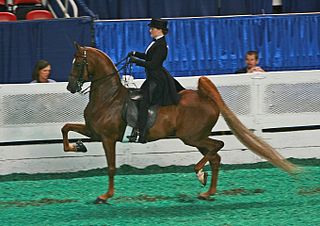
Saddle seat is a style of horse riding within the category of English riding that is designed to show off the high action of certain horse breeds. The style developed into its modern form in the United States, and is also seen in Canada and South Africa. To a much lesser extent, it is ridden with American action horse breeds in Europe and Australia. The horse breeds mainly used for this flashy style are typically the showy Morgan Horse, and the high stepping American Saddlebred.
Plainfield High School is a comprehensive community four-year public high school that serves students in ninth through twelfth grades from Plainfield, in Union County, New Jersey, United States. The school is part of the Plainfield Public School District, one of New Jersey's 31 former Abbott districts. Plainfield High School was established in 1857, making it the second-oldest high school in New Jersey. The school has been accredited by the Middle States Association of Colleges and Schools Commission on Elementary and Secondary Schools since 1928.
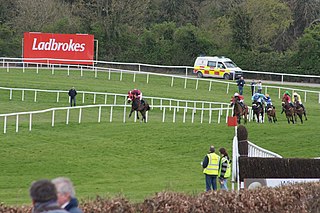
Punchestown Racecourse is located in the parish of Eadestown, between the R410 and R411 regional roads near Naas, County Kildare, in Ireland. It is known as the home of Irish Jumps Racing and plays host to the annual Punchestown Irish National Hunt Festival. The racecourse itself is right handed with an undulating hurdle and steeplechase track. The hurdle course is one mile six furlongs in distance while the chase course is 2 miles. Punchestown Racecourse also has the only cross country banks course in Ireland.

Piping Rock Club is a country club in Locust Valley, New York.
The Advance Stakes was an American Thoroughbred horse race run annually from 1899 through 1910 at the Sheepshead Bay Race Track in Brooklyn, New York. An important race open to horses age three and older, it was raced on dirt. The final running took place on June 27, 1910 and was won by Ballot for the second time.

Olympia London International Horse Show is one of the UK's biggest equestrian competitions, held at Olympia, London. It is best known for its showjumping, however it also has competitions in horse showing, driving, mounted games, dog agility and more recently dressage. Evening sessions are broadcast live by the BBC each year, with the puissance. It is held over seven days, in the week preceding Christmas, and many of the events are Christmas themed.

The Wesley Clover Parks are recreational parklands in Ottawa, Ontario, Canada, located at the intersection of the 416 and 417 highways in the former city of Nepean. Wesley Clover Parks was established in 2014 when the Wesley Clover Foundation took over operations of the former Nepean National Equestrian Park, and the adjacent Ottawa Municipal Campground.
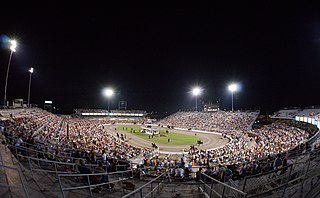
The Tennessee Walking Horse National Celebration (TWHNC), sometimes known as the Celebration, is the largest horse show for the Tennessee Walking Horse breed, and has been held annually in or near Shelbyville, Tennessee since its inception in 1939. The Celebration was conceived by Henry Davis, a horse trainer who along with several other horsemen, felt the Shelbyville area should have a festival or annual event. Although the Celebration was originally held in Wartrace, Tennessee, it moved to Shelbyville, the seat of Bedford County, a few years later. The Celebration spans 11 days and nights in late August and early September annually, and finishes with the crowning of the World Grand Champion Tennessee Walker on the Saturday night before Labor Day. The TWHNC draws an estimated 2,000 horses and 250,000 spectators to Shelbyville each year.
The Racking Horse World Celebration is the largest show for the Racking Horse breed. It is held annually in late September at the Celebration Arena in Priceville, Alabama, a few miles outside Decatur. The Celebration encompasses over a week of nightly shows, and includes approximately 170 classes. Over 1,000 horses compete there each year, and spectator attendance is roughly 70,000. The World Celebration's counterpart is the Spring Celebration, held in April at the same location.
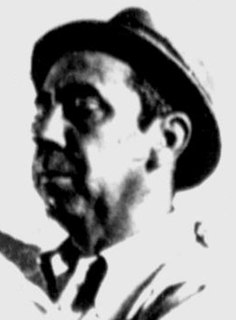
Emerson "Bud" Dunn was a Tennessee Walking Horse trainer from Kentucky who spent most of his career in northern Alabama. He trained horses for over forty years and won his first Tennessee Walking Horse World Grand Championship at age 74 with Dark Spirit's Rebel; at the time, he was the oldest rider to win the honor. He was inducted into the Tennessee Walking Horse Hall of Fame in 1987 and named trainer of the year in 1980 and 1991. In 1999 at age 81, Dunn surpassed his own record for the oldest winning rider by winning his second World Grand Championship, riding RPM. He died of a heart attack in January 2001.
The Plainfield Riding and Driving Club announced to-day its prize list for the eighth annual horse show to be held on the show grounds June 1, 2, and 3, and it is the most attractive in the history of the club, aggregating several thousand dollars in cash purses and many cups. ...
The unusual spectacle of the champion gig horse Nala being unplaced in a class with only two other entries was witnessed to-day at the second day's session of the Plainfield Riding and Driving Club's annual horse show on the club grounds. Joseph W. Harriman's famous harness horse probably never made a poorer showing in the ring, and the award was never questioned either by the experts or spectators.